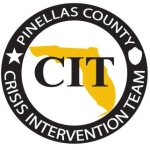
Throughout the state, more than 3,000 law enforcement officers have been trained in the nationally acclaimed 40-hour CIT course. The faculty are all professionals, family members or consumers from the local mental health community. They volunteer their time and talents to provide the most up-to-date information to law enforcement officers. The information is regarding mental illnesses, medications, deescalation techniques, Baker Act authority, and unusual behaviors such as suicide, homicide, and aggressiveness. The course includes discussion with persons having a mental health condition who share their past interactions with the law.
The Memphis Model
CIT was originated by the Memphis, Tennessee, Police Department. CIT trained officers are capable and willing to routinely and repetitively handle this type of non-criminal call for service in addition to their normal patrol duties. Repeated opportunities to develop techniques and gain knowledge of the mental health system are of paramount importance for successful and safe interventions.
Dispatching CIT trained officers on calls involving persons having a crisis due to a mental disorder demonstrates CIT’s value to the community through the saving of lives, time and money. The Memphis model CIT programs now are in place in cities across America, as well as in other countries.
CIT International
To continue program development, an International CIT organization was created. Their primary purpose is to facilitate understanding, development and implementation of Crisis Intervention Team (CIT) programs throughout the United States and in other nations worldwide. CITI promotes and supports collaborative efforts to create and sustain more effective interactions among law enforcement, mental health care providers, individuals with mental illness, their families and communities, and also to reduce the stigma of mental illness.
CIT International works to accomplish this purpose by raising public and stakeholder awareness through education and outreach, establishing and disseminating recommended standards for developing, implementing and sustaining crisis intervention programs, providing assistance to communities interested in developing CIT programs, supporting research, improving public health and safety, evaluation of CIT programs and partnering with CIT programs in various localities to hold annual International CIT Conferences.

